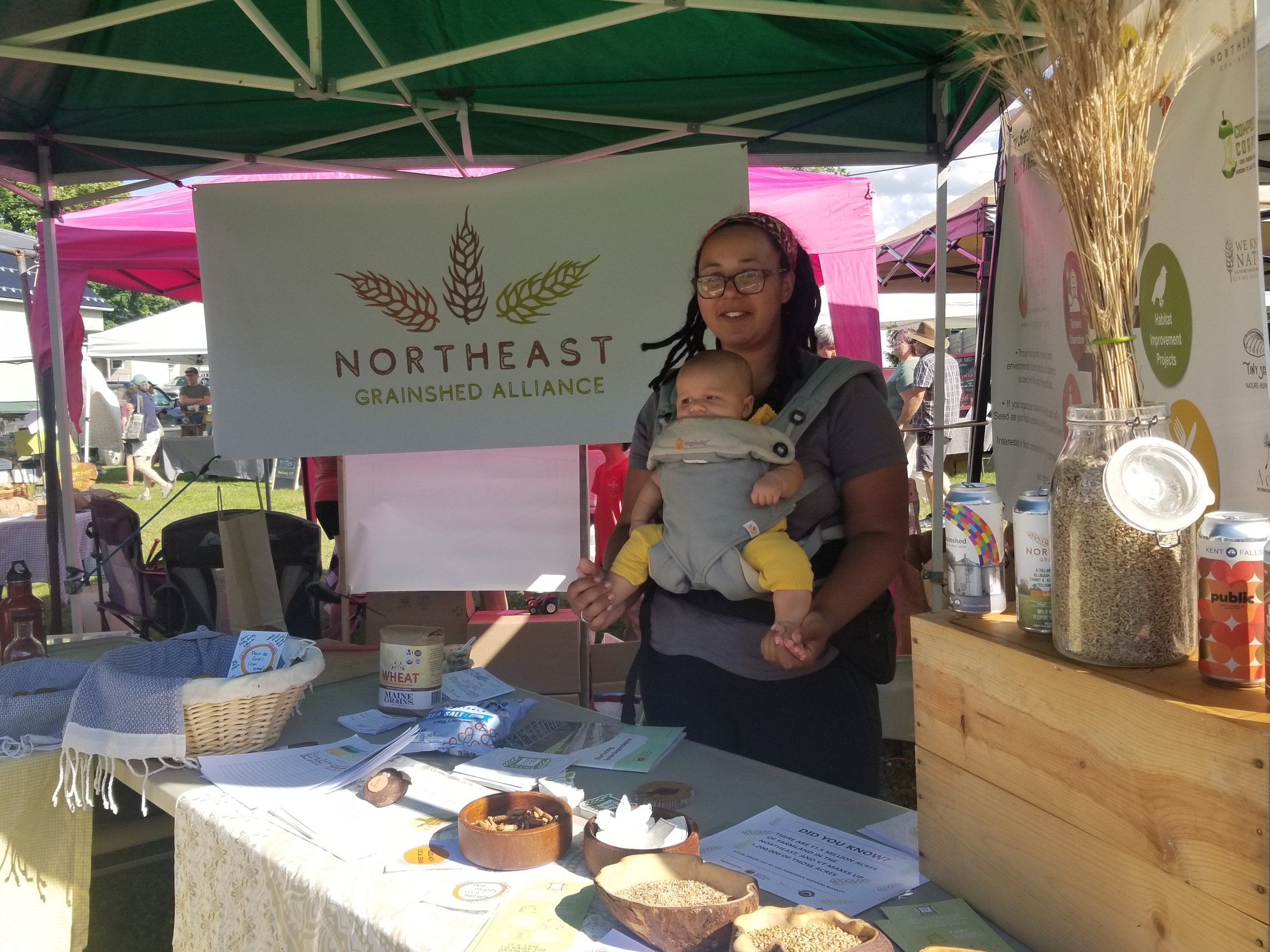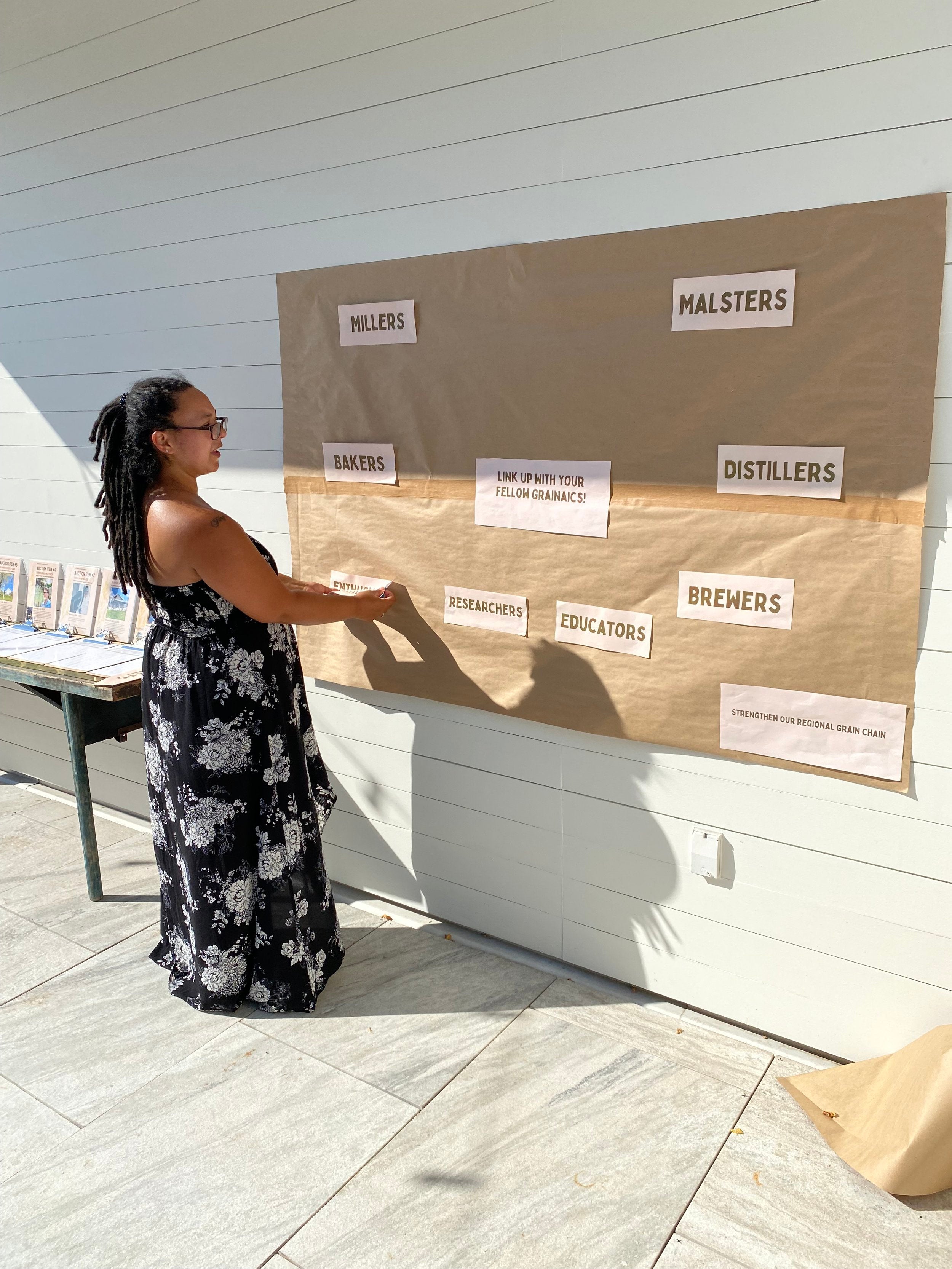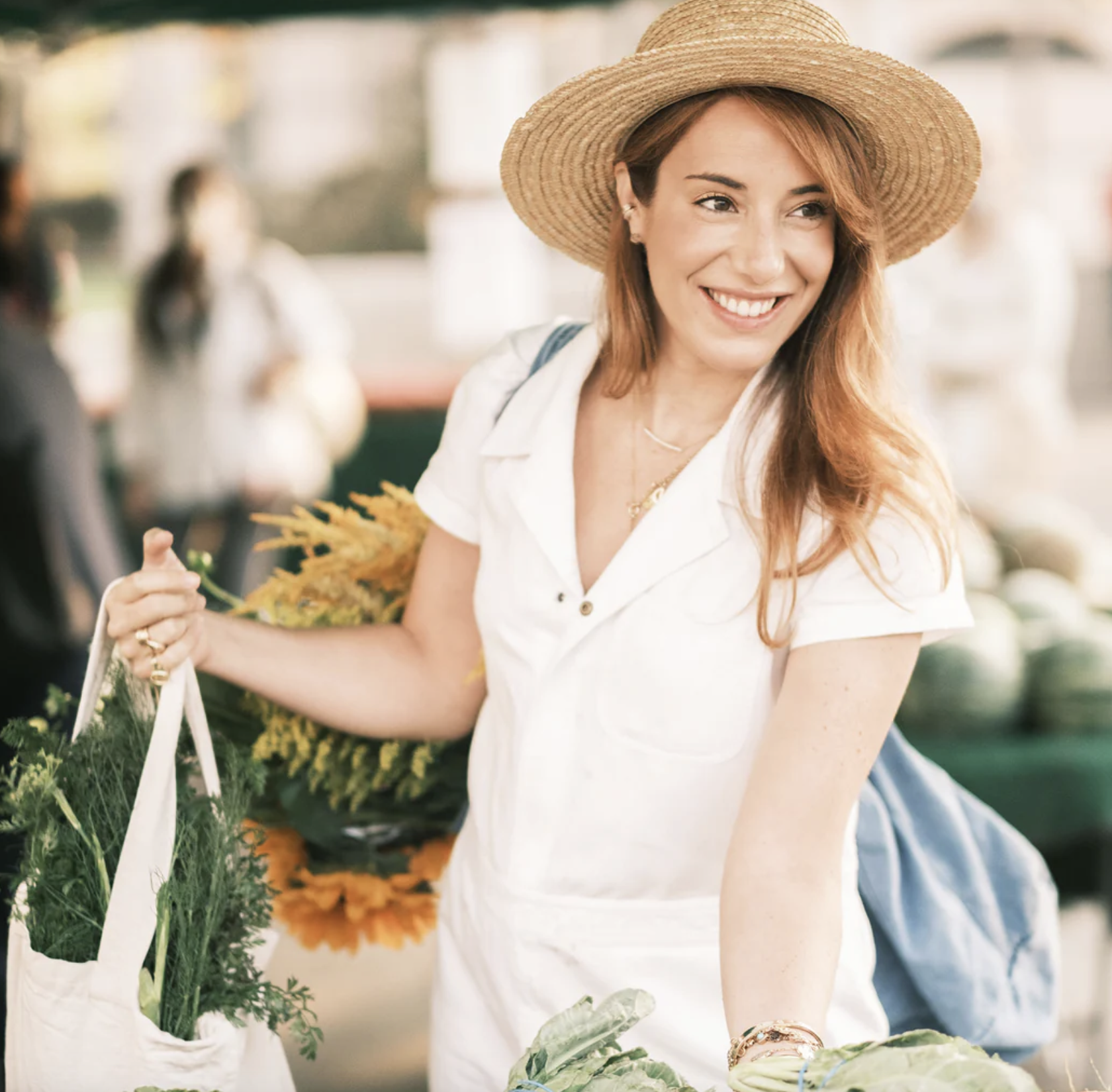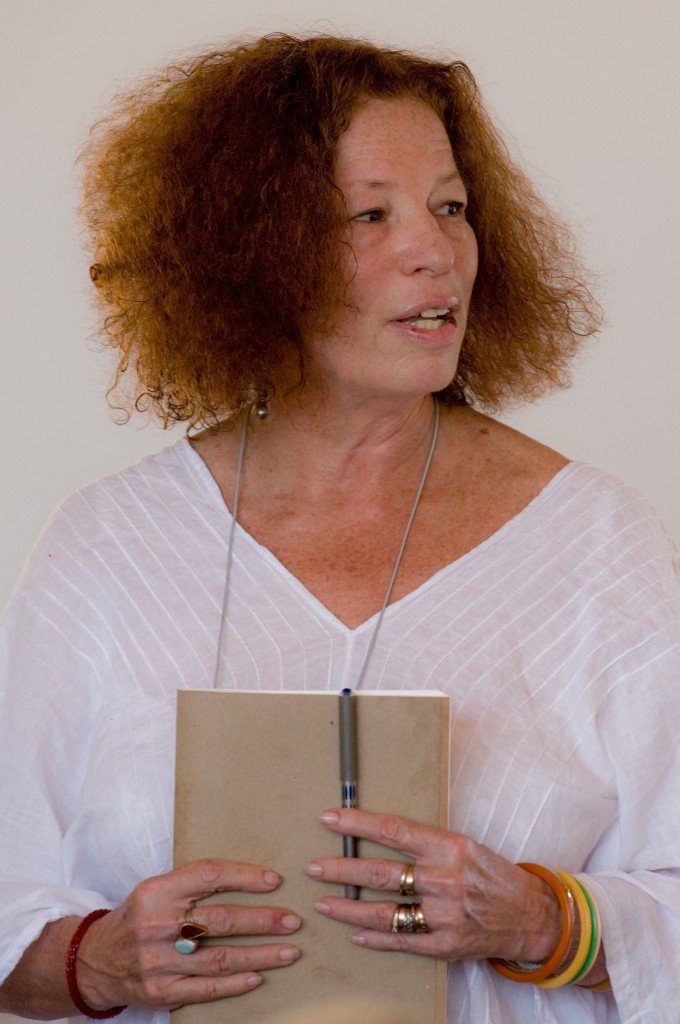Hannah is Going With the Grain
In conversation with Hannah Smalls, Executive Director of the Northeast Grainshed Alliance
After graduating with a degree in agroecology and sustainable agriculture from UMass Amherst, Hannah Smalls began working as a brand ambassador for One Mighty Mill, a stone-milled flour and baked goods company. She would demo the brand’s breads and bagels at Whole Foods Market locations, offering customers samples alongside information about the benefits of local whole grains—until the pandemic hit and she was laid off.
But One Mighty Mill didn’t forget about Hannah. Its co-founder John Olinto reached out to her in October 2020 with a new job opportunity: outreach coordinator at the Northeast Grainshed Alliance, a diverse stakeholder nonprofit organization dedicated to supporting the local grain chain. “I didn't really know what I was getting myself into,” she remembers. “I spent the next two years working off of a USDA grant, developing our strategic plans for everything from how to help grain farmers to how to increase demand for Northeast-grown grain.”
In November 2022, Hannah was promoted to executive director, her first leadership position at a nonprofit. She’s working tirelessly to lead the organization, which is only a part-time gig, while also farming organic fruits and vegetables. “I've always wanted to be a farmer, so it's been really cool to be on the other side of it, too, running a technical support organization for grain farmers and all different members of the grain chain,” she says. Here, she shares more about the Northeast Grainshed Alliance and all the progress she hopes to make in the future.

Mast Journal: What is the Northeast Grainshed Alliance?
Hannah Smalls: The Northeast Grainshed Alliance was basically conceived after our inaugural symposium in February of 2020. And that was an amazing event that brought together about 250 key stakeholders within our Northeast grain chain, from grain farmers to millers to maltsters to small brewers to small distillers, also home baking and brewing fans, educators of grain, and researchers of grain. Grainshed is a word play on watershed and shows the cyclical relationship we have with our farmers and those who process the grains and the producers who create amazing artisan craft bread, beers, and spirits. Our main mission is to grow the demand for Northeastern grain.
In the past three years since our conception, it's been solely focused on working with our founding members and boosting up our SQFT Project, which is bridging the gap of consumer awareness of Northeast grain. We have a logo that hopefully will be trademarked by the end of this year that will allow our members to show how much square footage of Northeast grain is in their beers, flours, or spirits. And then that actually really connects people who are eating these grains every day to the actual farmers who are growing it.
MJ: That's fantastic. And what is the experience for a member of the alliance?
HS: I like to talk about the brewer, Barry Labendz of Kent Falls Brewing Company, that started this idea five years ago. He just had a duct tape four by four foot square in his brewery that showed how all of his beers were one hundred percent Northeast grain. And he realized that a lot of his customers didn't really know that beer is a very heavily agricultural product. Beer is not talked about as much, especially in the local food arena. I've heard a lot of really good feedback that people are having more of a relational experience with these beers because they're able to really see their impact on local farms.
So it definitely started with our small brewery members because obviously beer is a little less talked about when we talk about local grains, but also we have a founding miller member, Ground Up Stone Milled Flours, and they have the logo on their five pound flour bags. And I've heard some really great things about people realizing that a whole bag of their flour can be 95 square feet of grain farmland. And people really take pride in that, knowing that they're directly supporting farmers in their community.
MJ: Awesome! And what are you working on now?
HS: Now, I’m waiting on the second round of a grant that will push this organization to the next level. And I'm really hoping to get some good news back about it in the next few months. It's basically an implementation grant, so the money would go to a three year period of implementing strategic action, having two more staff people under a larger funding executive director, and doing the things we said we've wanted to do these past few years while researching and planning.
MJ: Crossing our fingers for you! What are the strategies you plan to implement?
HS: We have five objectives. The first one is basically increasing awareness and education through more workshops and partnering with other amazing regional food organizations, like New England Feeding New England. We also want to hire a market and development coordinator who would strictly be involved in working with institutional partners to help support our members who want to get into different market streams.
The second one would be putting together an amazing annual symposium. We took off two years and we're planning on our second annual symposium this November. Having this yearly event in person is crucial. We're also going to have a virtual piece for people that can't make it. It's in Canton, Massachusetts at Trillium Brewing, one of our founding members.
And then the third objective would be having more workshops that benefit our farmers, connecting them to their cooperative extensions, and building up more technical assistance in the realm of growing.
And then we have our SQFT Project, which is an objective of its own. Bolstering this up and making sure the trademark goes through will basically give it more credentials and hopefully get more members. We want our members, especially our larger members like Allagash Brewing, to get excited about showing how they are using Northeast-grown grain. And then we would also be hiring a SQFT Project manager to solely oversee this project.
The last one is a really exciting one for the farmers. It's a variety trials program where we would test all these varieties that have been in testing for years and add a production trial component to that. So there's actually a grain innovation center that's going to hopefully open this November at Hartwick College in New York. Their craft food and beverage department is really amazing. They would be testing the grains that are grown by our farmers for the processors and also for our producers, our bakers and our brewers who are using these different varieties. They want to find out what works in growing with the ever-changing climate, but make sure that the varieties that grow well also bake well, mill well, brew well, and distill well.

MJ: Wow, that’s so interesting. And it sounds like a lot of work will go into accomplishing each of these goals. What does your day-to-day job look like?
HS: I am still part-time, so I reserve about three hours per day Monday through Friday for this job. It's a little bit more flexible sometimes, but I usually spend the morning checking emails. There are always people trying to connect with our members or just general inquiries about who we are. I'm the only person right now, so I need to make sure any operational tasks are complete. I post on social media and I work on these strategic plans that I just summarized. In case the application for the OCA grant doesn't get accepted, I need to find another avenue to make sure that we can be funded to do these things that we want to do. The symposium is my main focus right now, making sure that it goes off without a hitch and it's an amazing event for our members.
MJ: Totally. And what do you do with the rest of your time?
HS: I'm a farmer. I’m trained as an organic and regenerative farmer for diversified veggies. I love grains, but it's just not for me. I've seen, from talking with a lot of our grain farmers, it takes a lot of time commitment. All kinds of farming does, but especially the infrastructure and investment upfront, grain farming is just not the avenue for me. So I actually work on an orchard part-time, as well, and I'm in the planning stages of creating my own market garden and community farm up here in Windham, Maine.
MJ: That’s super cool. And you’re still doing a lot of work for the grain chain even if you’re not growing grains yourself.
HS: Exactly. Our first symposium made it clear that the key founding members needed someone like me as the middleman for doing all these little jobs that seem to be missed because they all have these amazing businesses that they're trying to keep running as well. So I see that as the main importance of my job at the Northeast Grainshed Alliance.
MJ: Someone needs to bring everything together! And everyone connects with each other remotely?
HS: Yes. Our first coordinator was the president of the Tiny Seed Project, which is our fiscal sponsor, and they're based in Vermont, surrounded by two of our very big farmers, NEK Grains and Thornhill Farm. I’m in Windham, Maine and our board has one person from almost every state in the Northeast right now. It's a really interesting thing that came out of the pandemic. It definitely was hard at first trying to convene and do all this planning virtually. But now we have an annual board meeting where we meet in person, monthly virtual meetings, and as many in-person workshops and events as possible.
MJ: That makes sense. And do you find that a lot of the members of the alliance are working together? Are the farmers selling their grains to the millers or brewers or maltsters that are part of the group?
HS: Yes, but there definitely can be more. I definitely want to see more of this organic value chain coordination and networking with our farmers. I know that will happen a lot at our symposium, but also at field days and if we get this grant, there's a lot of opportunity for more workshops and member meet-and-greets to continue that connection.
MJ: Definitely. And this might be an obvious question, but why is supporting the local grain chain so important?
HS: It's simple, but it's also very complicated. There are a lot of different important aspects. I'm an organic farmer at heart, but I always will shop local before organic because keeping my money in the local economy is really powerful, especially in this day and age. And I hope other people will feel the same way. They can go on our website and look at our local grain directory to see where farmers, millers, maltsters are located. And then there are the climate change aspects. We've seen a lot of crazy events in the past couple months with smoke and flooding, so shopping local is really important when it comes to transportation and emissions.
More from The Journal

Nothing to Waste with Camilla Marcus
In conversation with zero-waste entrepreneur and pioneer Camilla Marcus, founder of west-bourne. She shares her path, her passions, and her next steps.
Read more
A Poem a Day with Esther Cohen
In conversation with poet (and neighbor) Esther Cohen. She shares her road to writing, her love of New York, and her undivided care for all of us.
Read more